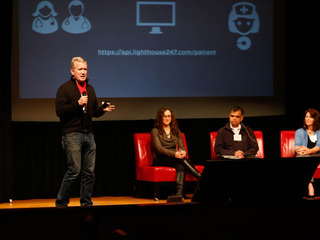
Most people probably think of diabetes as a problem in the United States, but it’s becoming a problem all around the world. The percent adults over 18 years globally who have diabetes has risen from 4.7 percent in 1980 to 8.5 percent in 2014.
To combat the problem on a global scale, diabetes monitoring platforms Glooko and Diasend have decided to combine forces, it was announced on Tuesday. The newly merged companies will continue to operate under the name Glooko, with all employees of both companies keeping their jobs.
Rick Altinger, Glooko’s CEO, will be CEO of the merged organization, while Anders Sonesson, Diasend’s CEO, will manage Global Operations for Glooko. All of the four current offices held by the two companies will remain: Mountain View, Chicago, London, and Gothenburg in Sweden.
“We plan to remain in the regions we currently do business in – and even expand as the opportunities grow,” Altinger told me.
“While Glooko specializes in remote monitoring tech, Diasend specializes in diabetes data captureamd diverse international deployments. Combined, we’re uniquely equipped to meet the world’s diabetes remote monitoring/telemedicine needs, which vary by country due to differing healthcare, economic, and social circumstances.”
With Diasend, Glooko now serves 4,000 diabetes clinics in 23 countries across 15 languages, impacting tens of millions of people with diabetes. The joint platform can download data from more than 160 different devices, including glucose meters, insulin pumps, continuous glucose monitors and activity trackers, in total covering over 95 percent of diabetes devices used worldwide.
“Glooko & Diasend are the dominant players in diabetes data management in their respective markets, the USA and the EU. The Glooko and Diasend teams have always been friendly and have had a mutual admiration for each other’s dedication in helping people with diabetes, and their healthcare teams,manage their condition,” Altinger said.
“Over the years, our leaders have met to share ideas and discuss the industry. Over the past few months the leadership teams of our respective companies have been working together to determine if our merger is a good fit. After deep analysis of organizational, legal, product, marketing, regulatory and other issues, we determined that not only are we a good fit, but together can make a real impact on making diabetes management easier!”
The companies eventualy plan to merge their products, which will take place over the course of the next year, ultimately delivering a single product line into the market. The details of this are still forthcoming, though.
In addition to the merger, it was also revealed that, under the Glooko name, the companies have raised $8 million in a funding round led Canaan Partners. Other investors include Social Capital, Samsung Ventures, and Yogen Dalal. The company will use the funding to accelerate technology integration and sales efforts.
Launched at the end of 2010, Glooko had raised $27.7 million in venture funding on its own from investors that have included Canaan Partners, Medtronic, The Social + Capital Partnership and Samsung.
The Gothenburg, Sweden-based Diasend was founded in 2005 and hadn’t disclosed and investment information.
Tackling diabetes
In all, 29 million people, or 9.3 percent of the U.S. population, had diabetes in 2014, according to stats from the CDC. So, it’s no wonder that numerous companies have begun to try to solve what’s quickly becoming a very big problems.
That includes Lighthouse, a digital patient care program focused on diabetes, which won at our Vator Splash Health event earlier this year.
As CEO Dave Vockell told me in an interview, “By the time we’re done having this conversation, two people will die of diabetes, one person will lose a foot, 35 people will hear that they have diabetes for the first time, and two or three will have a heart attack.”
Jerusalem health startup Sweetch raised $3.5 million for its diabetes prediction platform in April, while Emperra closed a Series B round worth $3.1 million for its Esysta “smart” diabetes management system in January.
The biggest player in trying to solve diabetes has been Google.
In 2014, the company announced a smart contact lens, which measures glucose levels in the wearer’s tears via a tiny chip and mini glucose sensor embedded between two layers of contact lens material. It began testing the device in 2015.
Earlier today, Alphabet, Google’s parent company, revealed that French drugmaker Sanofi and Verily Life Sciences, formerly known as Google Life Sciences, had formed Onduo, a company with a mission “to help people with diabetes live full, healthy lives by developing comprehensive solutions that combine devices, software, medicine, and professional care to enable simple and intelligent disease management.”
(Image source: glooko.com)























